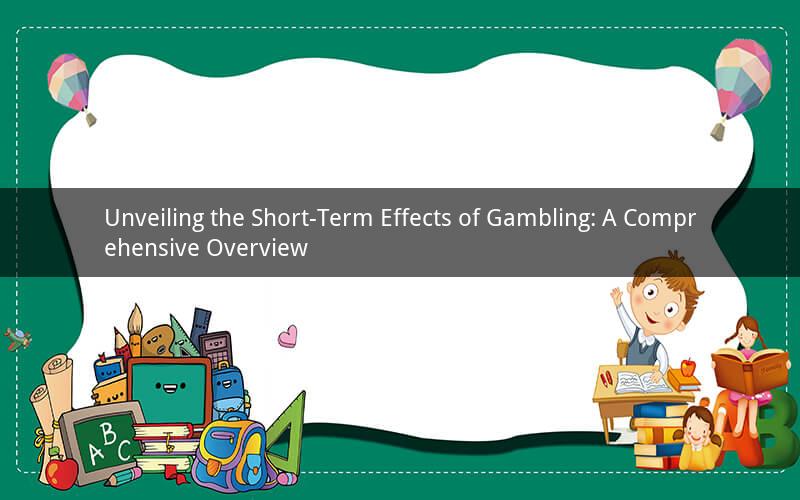
Introduction:
Gambling, an activity that has been around for centuries, continues to captivate individuals across the globe. While the allure of winning big money may seem enticing, it is crucial to understand the short-term effects of gambling. This article delves into the various impacts that gambling can have on individuals, both physically and mentally. By shedding light on these effects, we aim to raise awareness and promote responsible gambling practices.
1. Financial Implications:
One of the most immediate and apparent effects of gambling is its impact on an individual's finances. Here are some financial implications to consider:
a. Debt Accumulation: Many individuals who engage in gambling may find themselves in debt due to excessive spending. The thrill of winning can lead to a desire for more, often resulting in overspending and accumulating debt.
b. Loss of Savings: Individuals who are unable to control their gambling habits may deplete their savings, leaving them financially vulnerable.
c. Financial Stress: The fear of losing money and the pressure to recoup losses can lead to significant financial stress, affecting one's overall well-being.
2. Psychological Effects:
Gambling can have a profound impact on an individual's mental health. Here are some psychological effects to be aware of:
a. Anxiety and Stress: The anticipation of winning and the fear of losing can trigger anxiety and stress, leading to increased levels of cortisol, the stress hormone.
b. Depression: Individuals who experience significant losses or are unable to control their gambling habits may develop symptoms of depression, including feelings of sadness, hopelessness, and loss of interest in activities.
c. Compulsive Behavior: Some individuals may develop a gambling addiction, leading to compulsive behavior and a loss of control over their gambling habits.
3. Social Implications:
Gambling can also have negative consequences on an individual's social life. Here are some social implications to consider:
a. Relationship Strain: Excessive gambling can strain relationships with family and friends, as it may lead to financial difficulties and emotional turmoil.
b. Isolation: Individuals who are unable to control their gambling habits may isolate themselves from loved ones, leading to feelings of loneliness and isolation.
c. Legal Issues: In some cases, gambling-related activities may lead to legal issues, such as fraud or theft, further damaging one's social reputation.
4. Physical Health Effects:
Gambling can also have physical health implications, including:
a. Sleep Disruption: The stress and anxiety associated with gambling can disrupt an individual's sleep patterns, leading to fatigue and decreased overall well-being.
b. Increased Risk of Heart Disease: The constant stress and anxiety caused by gambling can increase the risk of heart disease and other cardiovascular issues.
c. Impaired Immune System: Chronic stress and anxiety can weaken the immune system, making individuals more susceptible to illnesses.
5. Impact on Work Performance:
Gambling can also have a negative impact on an individual's work performance. Here are some potential effects:
a. Decreased Productivity: Excessive gambling can lead to decreased focus and productivity, as individuals may spend significant time and energy on gambling activities.
b. Absenteeism: Individuals who are unable to control their gambling habits may be absent from work more frequently, affecting their career prospects.
c. Financial Stress: The financial strain caused by gambling can lead to increased stress, which may further impact work performance.
Conclusion:
Gambling, while seemingly harmless, can have a range of short-term effects on individuals. From financial implications to psychological and social consequences, it is crucial to be aware of these effects and approach gambling with caution. By promoting responsible gambling practices and seeking help when needed, individuals can mitigate the negative impacts of gambling and lead healthier, more fulfilling lives.
Questions and Answers:
1. Q: Can gambling lead to addiction?
A: Yes, gambling can lead to addiction, known as gambling disorder. It is characterized by an inability to control gambling behavior, despite negative consequences.
2. Q: How can I recognize if someone is struggling with gambling addiction?
A: Signs of gambling addiction include secretive behavior, borrowing money, lying about gambling activities, and neglecting responsibilities due to gambling.
3. Q: What can I do if I suspect someone is struggling with gambling addiction?
A: Encourage the individual to seek help from a professional. Support groups and counseling services are available to assist individuals struggling with gambling addiction.
4. Q: Can gambling affect my mental health?
A: Yes, gambling can have a negative impact on mental health, leading to anxiety, stress, depression, and other psychological issues.
5. Q: How can I protect myself from the negative effects of gambling?
A: Practice responsible gambling by setting limits on time and money spent, avoiding gambling when feeling stressed or emotional, and seeking support if you experience negative consequences.